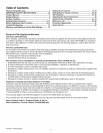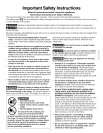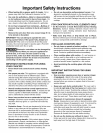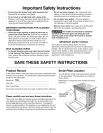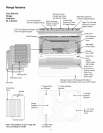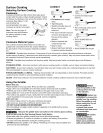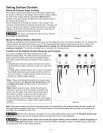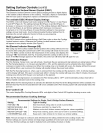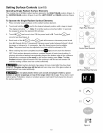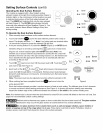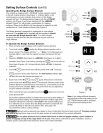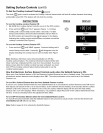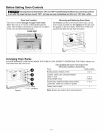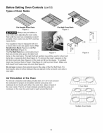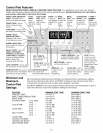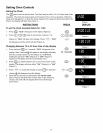
Setting Surface Controls (¢ont'd)
Operating Single Radiant Surface Elements
The cooktop has 4 SINGLE radiant surface elements: the RIGHT REAR position (Figure 1),
the CENTER REAR position (Figure 2) and the LEFT FRONT and REAR positions (Figure
3).
To Operate the Single Radiant Surface Elements:
1. Place correctly sized cookware on the radiant surface element.
2,
3.
4.
Touch and hold the pad for the desired element position until a beep is heard.
The display will show " -- ". Note: If no further pads are touched within 10 seconds
the request to power the element ON will clear.
Touch HI _ pad once to turn ON the power level to HI. Touch Lo
pad
once for Lo (See Figure 4).
Each touch of the HI _ or Lo _ pad will increase or decrease power levels
from 9.5 through 3.0 by .5 increments. Simmer power levels between 3.0 and 1.2 will
decrease or increase by .2 increments. Lo is the lowest power level available.
Note: The power level may be adjusted at any time while the element is ON.
5. When cooking has been completed touch the pad once to turn the element
OFF. Each surface element provides a constant amount of heat at each setting. A
glowing red surface heating area extending beyond the bottom edge of the cookware
indicates the cookware is too small for the surface heating area. Note: The Hot
Surface indicator light will remain ON if the cooktop is still hot and will remain ON
until the heating surface area has cooled sufficiently.
Radiant surface elements may appear to have cooled after they have been
turned off. The glass surface may still be hot and burns may occur if the glass surface is
touched before it has cooled sufficiently.
Do not place plastic items such as salt and pepper shakers, spoon
holders or plastic wrappings on top of the range when it is in use. These items could
melt or ignite. Potholders, towels or wooden spoons could catch fire if placed too close to
the surface elements.
Figure 1
Right Rear Element
Figure 2
Center Rear Element
Figure 3
Left Frontand Rear Elements
Figure 4
10



